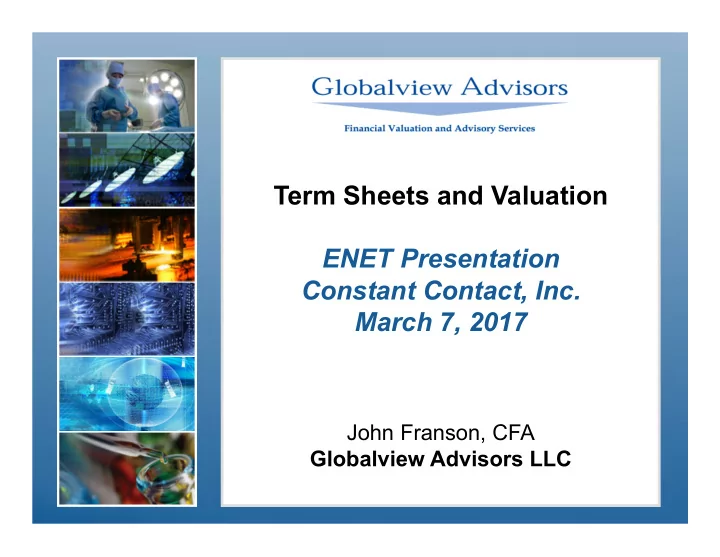

Term Sheets and Valuation ENET Presentation Constant Contact, Inc. March 7, 2017 John Franson, CFA Globalview Advisors LLC 1
1. Who are we? 2. What do we do? 3. View from our perspective? 4. What can entrepreneurs take away? 2
1. Who are we? Globalview Advisors is an international firm with offices in Irvine and Los Angeles, California; Boston, Massachusetts; and London, United Kingdom. We specialize in providing financial valuations and related advisory services for publicly listed and privately owned/unquoted companies in the U.S., the U.K., Europe, Asia, and other locations globally. Our financial valuations, opinions, and advisory services relate to businesses, business interests, intangible assets and intellectual property, and financial instruments. 3
2. What do we do? Globalview’s services are provided for a variety of purposes, including valuations of Businesses, Intangible Assets, Debt, Equity, and Derivative Instruments for: • Financial Reporting • Corporate Tax Planning, Compliance, and Reporting • Mergers and Acquisitions • Gift and Estate/Inheritance Tax Planning • Restructuring and Bankruptcy • Litigation Support/Dispute Resolution • Employee Stock Ownership Plans (ESOPs) We also provide Fairness and Solvency Opinions for a variety of reason. 4
Focusing on Business Valuations Globalview often uses a fundamental approach to assessing the fair value of a business enterprise and will often use this approach to determine the fair value of common stock shares. First we estimate the business enterprise value (BEV) using a combination of three methods: 1. Discounted Cash Flow Analysis (DCF) 2. Guideline Public Company Method (GCM) 3. Guideline Transaction Method (GTM) (Funding rounds may dictate a different approach.) 5
Discounted Cash Flow Analysis (DCF) Under a DCF, we use a forecast of revenues and cash flows (usually a 3-5 year forecast is required, but sometimes a 1-year forecast is all that is available – we work with it!). Ultimately we discount the cash flows to present value using a reasonable discount rate. Debt and cash are accounted for in determining the fair value of total equity. 6
Guideline Public Company Method (GCM) Under a GCM, we gather information on publicly traded companies’ multiples of operating performance to assess a range of possible values (e.g., revenue multiples or EBITDA multiples). We then apply multiples to realized and forecast measures of performance, such as revenues and EBITDA, to estimate value. Although size, scope, and operating history may differ greatly for younger, privately held companies, caveats are noted and multiples are selected with these factors in mind. Debt and cash are accounted for in determining the fair value of total equity. 7
Guideline Transaction Method (GTM) Under a GTM, we gather information on private transactions where companies’ multiples of operating performance to assess a range of possible values (e.g., revenue multiples or EBITDA multiples). Data are typically more limited under this method compared to publicly traded companies. We then apply multiples to realized measures of performance, such as revenues and EBITDA, to estimate value. Again, caveats are noted and multiples are selected with these factors in mind. Debt and cash are accounted for in determining the fair value of total equity. 8
A Synthesis of Value Emerges Globalview then assesses the value indications from the three methods described, and weights each one accordingly: 1. DCF • Reliability of forecast. • Expected use of cash flows. 2. GCM • History of operating performance • An IPO in the near future? Prospect of being acquired by a publicly traded company? 3. GTM • History of operating performance? • Activity in the relevant industry? 9
Allocating to Equity For a simpler business valuation where the value of total equity or per share of equity is required, the Current Value Method may be used where net debt and preferred preferences are deducted to determine: Equity = BEV less Preferred Preferences and Net Debt When a valuation is used for financial and tax reporting for deferred equity compensation (e.g., stock options), certain guidance from the FASB and IRS must be followed which complicates matters: FASB ASC 718 IRC 409A Under the latter scenario a “409A valuation” is required. 10
3. View from Our Perspective Ultimately cash flows determine value, whether they be operating cash flows or liquidity events (e.g., acquired for some amount in the future). Growth in cash flows can dictate multiples of value within an industry or sector. Operating margins can dictate multiples of revenue within an industry or sector. 11
4. What can entrepreneurs take away? Auditors and authorities will require valuation analysis. Estimating value is an iterative process marked by multiple exchanges of information and commentary. Concentrate on running the business and not the valuation. Valuations are performed as of a specific Valuation Date and do not portend to be what a company will be worth some day – they change and hopefully upwards. 12
John Franson, CFA, is a Director in Globalview’s Boston Office. John has 20 years of financial analysis experience, and his valuation experience includes valuation of business enterprises, intangible assets, and equity instruments for various purposes including common stock valuations, business combinations, goodwill impairment, corporate acquisitions and divestitures, litigation support, and financial and tax reporting. John received his MS in Finance from Boston College and his BA in Economics from the University of New Hampshire. He has successfully completed the business valuation curriculum of the American Society of Appraisers (ASA), as well as the national exam on the Uniform Standards of Professional Appraisal Practice (USPAP). John is a Chartered Financial Analyst (CFA). He can be reached at 617 ‐ 725 ‐ 1954 or jfranson@globalviewadvisors.com. www.globalviewadvisors.com 13
Recommend
More recommend